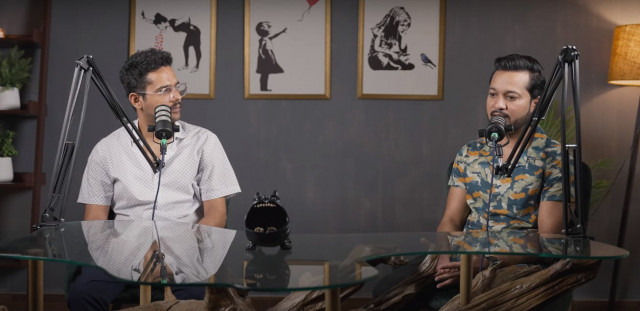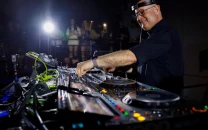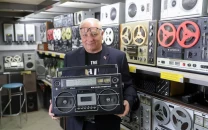Ali Gul Pir, Lenny Massey explore the Christian community's contribution to Pakistan's music scene
Rapper, saxophonist also discussed struggles of session players in the country

“Before the show, they run after you. After the show, you run after them. Because it always takes a lot of pestering and constant reminders to get people to pay you your money here,” saxophonist Lenny Massey told Ali Gul Pir on the latter’s podcast.
The latest episode of Pir’s AGP focuses on the Christian community’s role in Pakistan’s music scene. Massey was part of Pir’s songs Sorry and Cousin Dhazan. A well-known session player of Karachi’s diverse music circuit, the 34-year-old has been practicing music since the age of 8.
Mostly known for his covers of popular songs and jazzing his way through the metropolis with his band Club 777, Massey is one of the if not the most sought-after saxophone players in the country. While introducing Massey, Pir reminded his listeners that a huge part of Pakistan’s music community has always been Christian.
“The golden era of Pakistan’s music, late 70s onwards, majority of your pop, jazz and rock bands comprised of by Christians. The industry became saturated after but these guys have always been the pioneers of the Pakistani sound,” the rapper said. “This film based on Norman D' souza, 1979, shows the life of Karachi in the 70s. You’ll see there were discos, cabarets, casinos, and how everything was very open. Women could wear what they want. It was a secular society with so much tolerance,” shared Massey. “Unfortunately, now things have changed,” he lamented.
Massey went on to explain how members of his community, despite growing up in a conservative society, are always exposed to music because of the church. “When you go to the church for mass and services, there is always a choir that is singing. So unknowingly, you are fed with music. By the time you begin to understand it, it’s already in your system. And you can always take part in a choir, if you sing, if you play an instrument, you can always be part of that existing group. That’s how I started,” revealed Massey. The musician shared how the choir also helps the artists get exposure.
“Lenny is the most hardworking performer in Pakistan because I haven’t seen anyone who does more shows than him,” assured Pir. The host went on to ask Massey how it is for him performing in today’s Pakistan, as opposed to the freedom and open-mindedness enjoyed by performers of his community back in the 70s. “I will first elaborate on why I play so many gigs,” remarked Massey. “It is because I play a unique instrument – the saxophone. And because not many people play it, there’s a huge vacuum that needs to be filled. So I get offered these many opportunities. Now, the opportunities usually lie at private parties where I get to perform with DJs. That is always a good experience. But sometimes for public events I’ve had such terrible experiences,” he recounted.
“I played a show once, received half the payment. And for the remaining half I had to constantly message, send reminders, beg for the next six months. But people have no ethics here,” Massey scorned. “The least you can do is acknowledge the message if you have seen it. When they need you to perform, they will be so kind to you. But when you’re constantly asking them for what they owe you, they say things like, ‘I don’t have money your money right now, stop bothering me!’”
Massey acknowledged that while there are still good people out there, who pay performers before they go on stage and offer food after, the country still has a long way to go in terms of learning hosting ethics and paying respect to performers they so dearly want when need be.
Watch the podcast here:



















COMMENTS
Comments are moderated and generally will be posted if they are on-topic and not abusive.
For more information, please see our Comments FAQ